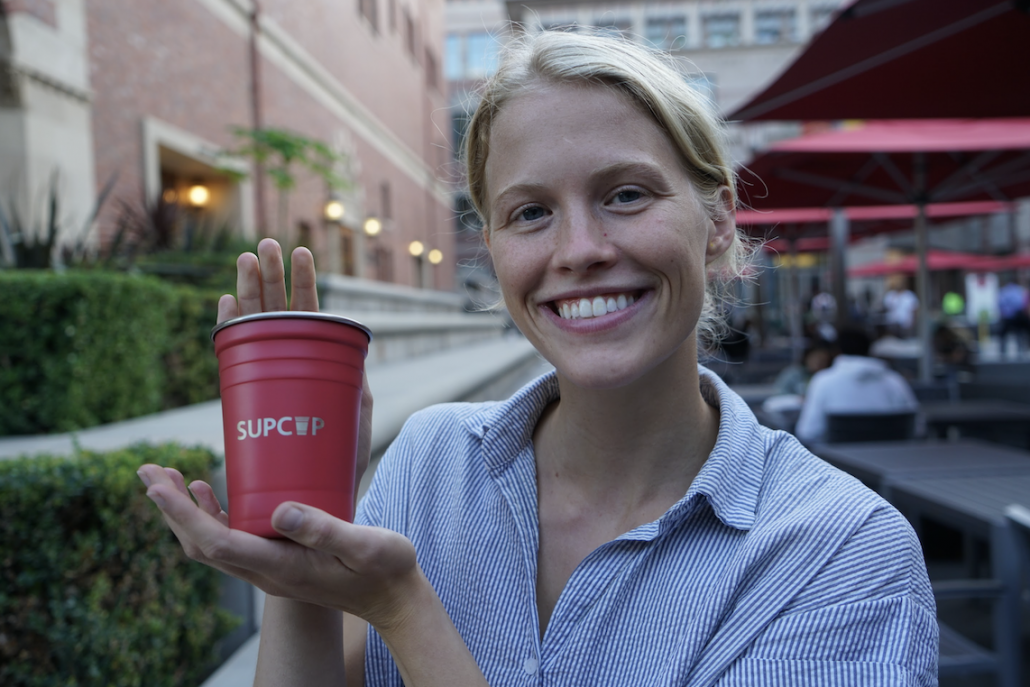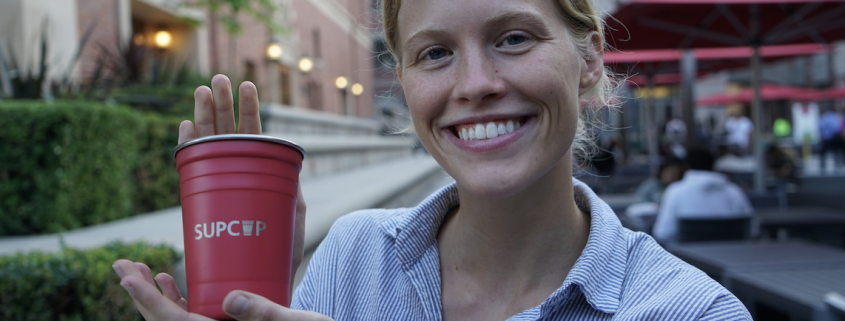USC senior creates sustainable, reusable party cups

Whenever senior Daphne Armstrong visited Greek Row after a weekend full of parties, she always thought about the thousands of plastic red Solo cups littered on the ground that would end up in landfills.
After realizing how wasteful and harmful party cups were for the environment, Armstrong, who is majoring in psychology and public policy, decided to take matters into her own hands by creating startup SUPCUP, which aims to reduce the amount of waste caused by college parties.
Launched in September, the company sells reusable red party cups made of stainless steel as an alternative to the traditional plastic ones typically used for many social events. SUPCUPs look identical to their counterpart and are sold individually and in packs of four, 10 and 20. Since its launch, over 400 cups have been sold, Armstrong said.
“Traditional red party cups are made from plastic No. 6, polystyrene, which cannot be recycled,” Armstrong said. “So all of these cups, even if you use them for 15 minutes, are on Earth like in landfills or the ocean where it takes 450 years to decompose into microplastics.”
Despite lacking background knowledge in entrepreneurship or business, Armstrong was inspired to create SUPCUP due to her love for nature. When she moved from Missouri to California for college, Armstrong began to immerse herself in the environment by becoming an avid surfer and a trip leader for Peaks & Professors, a student group that organizes outdoor adventures.
She then decided to take courses on climate change, where she first learned of the environmental impacts of plastic and that party cups were not recyclable.
“[That fact] was a huge shock to me because I had always assumed they were, even as someone who’s hyper-aware of their plastic usage,” Armstrong said. “So we’ll go through four or five cups a night, just not really thinking about it. Learning that fact, coupled with seeing all the waste [at Greek Row] everyday, just made me have to do something about it.”
Armstrong also attributed the development of her startup to Blackstone LaunchPad at USC, a campus resource that provides mentorship, ideation and venture creation to aspiring student entrepreneurs.
James Bottom, project director of Blackstone LaunchPad USC, said SUPCUP was a unique company.
“I’ve been meeting Daphne for a while,” Bottom said. “It started off as an interesting idea that she had, mostly because she wanted to figure out a way to improve the sustainability of some of the things that she’s seen.”
He also added how transitioning to the use of sustainable cups is important for college culture.
“There’s a lot of pregame activities that take place all over the United States, and I think that a lot of college campuses, certainly if they have a big football crowd, will have a whole lot of people that are using red styrofoam cups or red Solo cups for their pregame activities,” Bottom said. “It’s just a lot of ways that is potentially easy to mitigate.
William Koch, a customer and senior majoring in international relations, said he admires the company’s goal to push sustainability on campuses.
“The college lifestyle is inherently fairly wasteful,” Koch said. “[The problem] is very easy to ignore and go for something that’s easier and quicker, especially red Solo cups, which are a defined part of college culture.”
Koch purchased SUPCUPs for Delta Phi Epsilon, USC’s professional foreign service and international relations fraternity, because he wanted the organization to be mindful during tailgates while still enjoying the social experience.
“I like SUPCUPs because they look like a regular red Solo cup,” Koch said. “You know you’re not losing anything out there … you can still be sustainable while doing the same things that you would with a regular solo cup.”
In the future, Armstrong hopes to expand her company to other college campuses and added that she would like to create reusable cups in different colors depending on a college’s colors.
“Even if people don’t buy the cups, my goal is to start conversations and create conscientiousness around single-use plastic consumption and to advocate wrecks on our planet,” Armstrong said. “I believe that even the tiniest behavioral changes cannot help but seep awareness into other habits in our daily life, and every cup can make a difference.”

